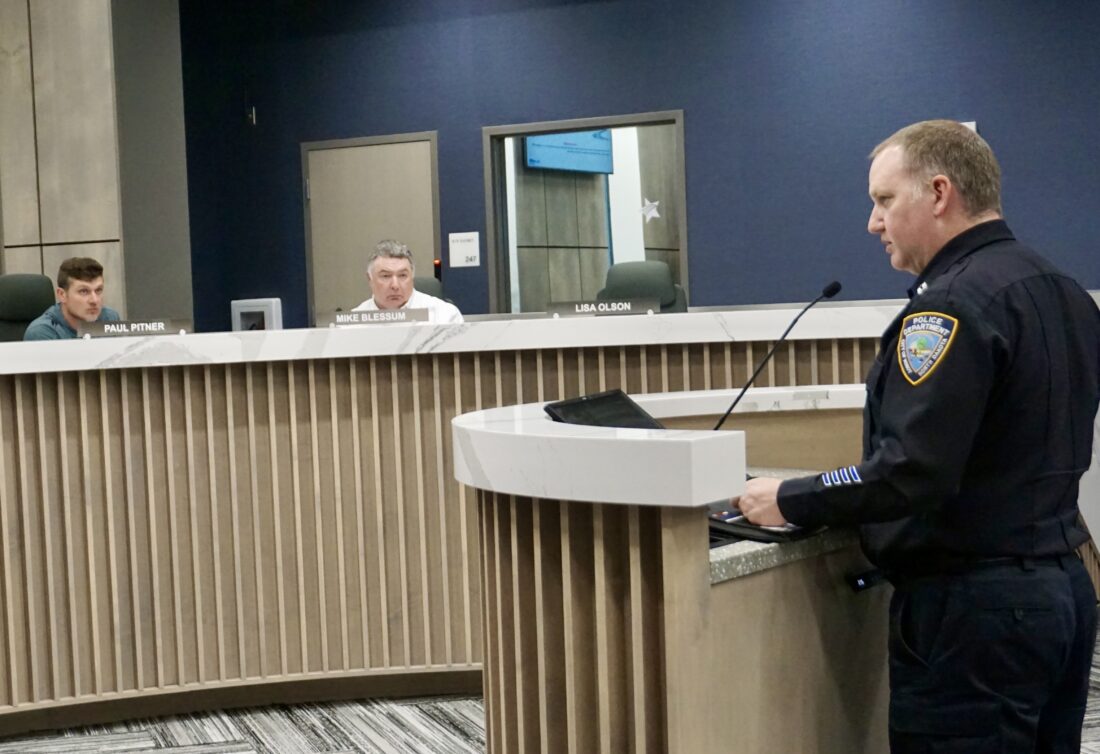License plate readers tabled again by City Council

Jill Schramm/MDN Interim Police Chief Dale Plessas speaks to the Minot City Council Monday regarding a proposed agreement to acquire license plate readers. Council members shown are Paul Pitner, left, and Mike Blessum.
A controversial proposal to acquire license plate readers as a tool to help the Minot Police Department locate wanted vehicles went back on the table after another round of discussion Monday.
The council voted 4-2 to table again an agreement with Flock Services for license plate reader (LPR) technology after discussion indicated a likely 3-3 tie, which would have killed the proposal. Council member Paul Pitner sought to table until after the mayoral election when a seventh vote will join the council.
“I still stand behind Flock as a very, very useful tool for us,” Interim Police Chief Dale Plessas said. Advantages of LPR technology include helping locate abducted children or missing persons and keeping officers safe with more information when they stop a vehicle for an offense.
However, Plessas added the police department will need to consider whether Flock rises to the level of a priority, given the tight budget situation in planning for 2026.
“To that extent, I want to make sure that you understand that there’s a good chance that I would not actually move forward with Flock until I have an idea of where the council’s going for our budget in the future,” he said.
Concerns about license plate reader (LPR) technology from a civil liberties standpoint were raised once again.
The council approved a policy document to place some protections in place related to the use of LPR technology. Plessas said the department’s draft policy sought to ensure LPR would not be used in minor offenses.
Pitner proposed other safeguards that the council amended into the policy that state LPR technology should not be used for general surveillance or intelligence gathering unrelated to specific, documented criminal investigations. Use must be tied to a specific case with a reason for the access. All access and data handling would need to be logged and be subject to quarterly privacy audits. A community oversight board would review the policy and audit reports annually.
“I’m not positive there’s anybody in this world that could write a policy that would get me there,” said council member Mike Blessum, who along with Scott Samuelson, cast a vote against tabling the matter and keeping it alive.
“It’s the general surveillance state that we head toward when we take these steps, “Blessum said. “We’ve found the place where we said, ‘No, I’m good being free, even though I’m giving up a little bit of safety.’ We can’t choose to give that up as members of our community, as members of our country. We can’t because there’s a slow slide that direction anyway.”
Council member Rob Fuller said the policy would need to be more in-depth, with more teeth, before he can support a system like Flock.
Council member Lisa Olson called LPR a useful tool for a police department that is short 15-18 officers on any given day.
“This gives them a tool that helps keep our community safer. It does not infringe on people’s civil liberties because the LPRs do not record a person’s face. It only registers a license plate number,” she said. She also noted the many ways people are under surveillance already on streets and in shops.
“We are tracked in all manner of different ways, and those are all voluntary. We choose which stores to walk into. We choose where to use our credit cards,” Blessum said. “In the case of this system, our government is choosing to track us.”
Samuelson voiced concern that LPR technology also can detect the type and color of a vehicle and can tie a vehicle to an owner.
The technology drew objections from a few members of the public. Resident Travis Zablotney called for a public hearing before the council makes a decision on LPR technology.
“To me, this is just a massive slippery slope,” resident David Wiley said. “It’s becoming a war against society, against the citizenry. I can’t find a word strong enough to say, ‘Please do not do this.'”
Symphony announces
lyrics contest winner
A team of five women have captured the essence of Minot and first prize in the Minot Symphony Orchestra’s anthem contest.
Ellen Fenner, executive director of the Minot Symphony Association, announced the results of a lyrics contest for a Minot anthem at the Minot City Council meeting Monday. Dr. Emerson Eads, director of Minot State University’s choral programs, will compose the music, and the anthem will be premiered by the symphony and area choirs in March 2026 in celebration of the symphony’s 100th year.
“Why Not? Open Prairies, Open Arms, Open Hearts” was composed by Kaylee Capp, Megan Klebe, Hannah Pederson, Arnikka Schreier and Rachel Voth, all of Minot. The five-verse anthem speaks of wheat fields, different cultures and neighborliness, concluding with “No matter how far we roam, to our dear beloved Minot, you will always be our home.”



